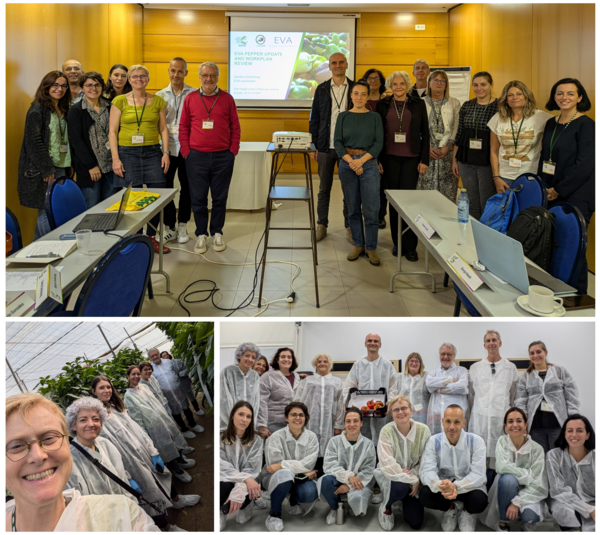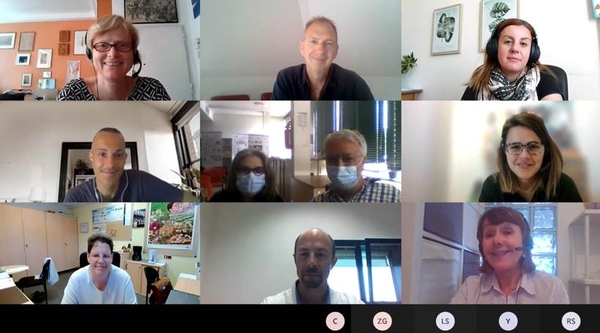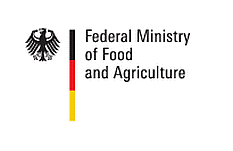EVA Pepper Project meetings
EVA Pepper project meeting 2024 and EuroPepLand kick-off meeting

On 30 and 31 October 2024, 16 participants gathered in El Ejido, Spain to review the work done in the EVA Pepper network and to kick off the EuroPepLand Grant Scheme Activity, with another 11 connecting online to follow the meeting presentations and discussions. The current EVA project, funded by the German Ministry for Food and Agriculture, is finishing in December 2024 and the network reviewed the work done over the past five years, during which 230 pepper accessions had been evaluated in field and lab trials for 26 traits, producing valuable results. An abiotic stress trial performed on a set of 160 Capsicum annuum accessions revealed interesting patterns as well as potential associations with genomic regions, valuable for future breeding programmes.
With the end of the current project, partners discussed how to continue their partnership and network activities, which is made possible through the connection with the ECPGR Grant Scheme Activity EuroPepLand. Twelve genebanks in this project presented their diverse pepper collections and previous work, and they will jointly define a core collection of around 400 European pepper landraces. This core collection will reflect the wide geographic and phenotypic diversity present in this secondary centre of pepper domestication, where this crop was first introduced in the 1500s. SNP genotyping and basic phenotyping of these accessions will guide the selection of new sets for multilocation evaluations by the EVA network and the project also intends to link with other previous, ongoing and future European projects on pepper.
The work planning for the coming years will have a special focus on the regeneration of materials for future evaluations, as sufficient quantities of seeds should be produced under controlled conditions considering the phytosanitary requirements for this crop and appropriate funding would be needed for this. Future trial planning will take into account the existing data to reduce the workloads for individual evaluators and new important traits such as abiotic stresses (salt and drought tolerance) will be considered. The EuroPepLand partners were invited to join the EVA Pepper consortium, which in this way will grow for future collaboration.
The meeting also included a visit to the facilities of Semillas Fito in El Ejido, where participants visited a greenhouse trial for mildew as well as a newly established post-harvest research facility, where storage conditions are simulated and their effect on the fresh produce tested.
The presentations of the EuroPepLand kick-off meeting are available here and the meeting report here.
EVA Pepper annual project meeting 2022
The 2022 EVA pepper annual meeting was held in hybrid form from 26-28 October 2022. Due to some last-minute cancellations, only seven partners gathered in person in Vico Equense, Italy, while seven connected remotely to review the project progress and discuss the work plan for the remaining project duration until the end of 2023. Partners reviewed criteria for the selection of accessions from European genebanks, of which 160 were used in phenotypic trials and genotyping. Genotypic data showed that the collection used in the project reflects a diverse set of accessions and may also hint at some misclassifications, showing the usefulness of genomics methods in genebank management. Phenotypic trials in the field, glasshouse and laboratories have produced a large dataset of observations which will be used to identify accessions of interest for breeding programs. Breeding company partners appreciated the access to genebank materials and confirmed their interest to continue their collaboration to evaluate more pepper accessions. The meeting participants also visited the research labs and warehouse of local project partner La Semiorto Sementi in Sarno.
The report of the meeting is available [here].

Annual Pepper Network meeting - 14 June 2021

June 2021
EVA Pepper annual project meeting: The second annual meeting of the EVA Pepper network was held online on 14 June 2021.
Fifteen members of the EVA Pepper network met online on 14 June 2021 to discuss ongoing activities and review protocols and data collection templates.
More than 200 pepper accessions had been multiplied by partners in Italy and Serbia and tested and certified to meet all phytosanitary requirements for ToBRFV. Despite some obstacles due to phytosanitary concerns over ToBRFV, all multiplied pepper seeds were distributed to partners in time and field trials have already started in Italy, Spain and Greece. These trials will create interesting data on agronomical and quality traits on 160 pepper accessions from different European genebanks. Lab trials for important diseases and genotyping of all accessions will complement the data.
Next years’ annual meeting will hopefully be held in person and in conjunction with a meeting of the ECPGR Solanaceae Working group.
- Meeting report (143,4 KB)
EVA Pepper Project meeting, 9 June 2020 - virtual meeting
June 2020
Twenty-two EVA Pepper network partners met virtually on 09 June 2020 to receive updates on current activities and discuss open questions and next steps for the project. A total of 250 pepper accessions were currently being multiplied by project partners in Italy and Serbia. Partners discussed strategies to comply with the new European Plant Health Regulation during the multiplication and distribution of seeds to evaluation partners inside and outside of the European Union, especially in light of emergency measures in place to prevent the introduction and spread of Tomato Brown Rugose Fruit Virus (ToBRFV).
After a break, the network partners reviewed the proposed trial protocol and gave an overview of their evaluation sites. Genotyping options were discussed and an appropriate protocol will be further developed by an expert group in the network. Partners also reviewed a list of traits collated from the Community Plant Variety Office (CPVO) and the EU Horizon2020 project G2P-SOL but agreed that, since not all evaluation partners were present at the meeting, preferences should be indicated during a survey and finalized in another meeting.
The EVA Pepper network made good progress in work planning and remains open for additional evaluation partners before starting evaluations of pepper accessions and landraces from European genebanks in 2021.
Meeting report (184,8 KB)

and Agriculture for the period 2019-2027.


